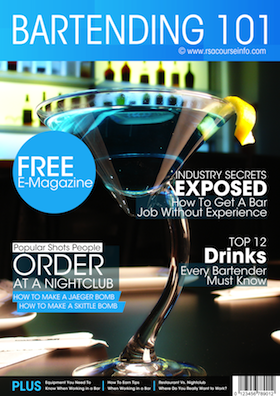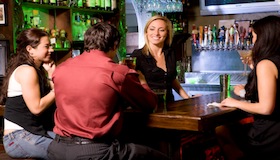Responsible Service of Alcohol ~
RSA in Australia
Alcohol in Australia
Excessive consumption of alcohol has long been a problem in Australia, because alcoholic beverages (Australians commonly refer to it as liquor) are already an integral part of our culture and tradition. Because of the risks and dangers posed by this problem, there are several alcohol laws imposed to monitor the sale and the way alcoholic beverages are consumed in Australia. However, each state and territory of Australia has its own governing alcohol laws.
RSA Rules in General
In all states and territories, liquor retail stores and outlets are obliged to obtain a license from governing authority of their own jurisdiction. Authorities may also need to monitor and verify their locations through planning laws and regulations.
The Federal government has a great influence on how liquor is marketed for it is generally responsible for regulating liquor importation all throughout Australia. This branch of the government has the control of imposing excise taxes over the company manufacturers of alcohol beverages that are imports in Australia. The Federal government is also in charge of the monitoring alcoholic beverages advertisements shown in television.
In Australia, it is illegal for minors (individuals under the age of 18) to buy, possess and drink alcohol in any licensed venue. However, some exceptions may apply. In some states, minors may have some liquor while eating at restaurants under supervision of parents or guardians and in some states, underage are allowed to consume alcoholic beverages at private premises as long as they are guided by at least one adult.
According to the Driver’s Licence in Australia, driving is not allowed for those with full driver’s licenses whose Blood Alcohol Concentration (BAC) is .05 or higher. Beginners, provision and learners with blood-alcohol present at any amount are never allowed to drive. While working, commercial drivers have a limit of BAC .02. In 2008, there were three proposals submitted to the Senate Community Affairs Committee. These proposals suggested that the allowable age to drink alcoholic beverages be moved to 21. According to the Drug Awareness, by age of 21 consumers are protected better from toxins.
Dry Zones in Australia
In South Australia, specifically in Glenelg, Adelaide City Centre and Port Augusta, there is what they call a “dry zone”. Local councils established “dry zones” to refer to local city parks and all other locations that were used for problem drinking, violence and anti-social behaviour. In some states, consumption of alcohol in public places is strictly prohibited. This includes local streets, footpaths and hiking trails.
RSA Laws by State
RSA in NSW
Liquor consumption in New South Wales is monitored by the 2007 Liquor Act. The acts consider the following behaviour as illegal, serving liquor to intoxicated consumers, failing to leave the licensed venue when asked by authorities to leave and pursuing to re-enter premises after being ejected.
In New South Wales, underage individuals are allowed to enter licensed venues accompanied by at least 1 guardian but are not allowed to purchase liquor. There is no law that prohibits minors to possess or consume alcohol in private premises, but there is a law that is against the selling of alcoholic beverages to minors and prohibits them to “take home” any liquor from licensed venues.
Liquor acts in NSW is against the selling and supply of alcohol to minors and intoxicated individuals.
RSA in South Australia
Liquor Licensing Act 1997 is the legislation the regulates alcohol consumption in South Australia. The act intends to reduce the risk of harm among the community which is generally associated with excessive alcohol consumption. In 1968, allowable drinking age lowered down to 20 and by the year 1971, it became 18. From 1836 to 1839, the Governor was the one who issues liquor licences for citizens.
In 1839, Act No. 1 was the first liquor licensing legislations applicable to the Province. The legislation included three major licenses:
- Storekeeper’s licence
- Wine, Ale Beer and other Malt Liquor Licence
- General Publican’s Licence
In 1869, another legislation was introduced, Storekeeper’s Colonial Wine Licence.
RSA in Victoria
Permits and regulations for alcohol consumption are under the Liquor Control Reform Act of 1998 and are handled by the Consumer Affairs Victoria.
In Victoria, it is illegal to sell alcoholic beverages to minors or those who are under 18, unless they are accompanied by a guardian or parent or anyone of legal age. Minors are also not allowed to enter at any licensed premises (venues where alcoholic beverages are sold and consumed) unless they are accompanied by at least 1 adult or other limited situations.
A number of licences are available. The most common ones include:
- Packaged Liquor Licence, regulates the sale of liquor to customers to bring home or carry away from retail outlets or supermarkets.
- General Licence. Licence that applies to taverns, pubs and hotels. It permits distribution and retail of liquor to customers for consumption on venues.
- On-premises licence, it permits the sale of alcoholic beverages to customers at any public venues such as in cafes, bars and restaurants.
- BYO Permit, it permits customers to bring their own alcoholic beverage and drink it on venues. Some restaurants and clubs who don’t prefer holding their licence obtains this.
Full club licence, pre-retail licence (for wholesalers, brewers producers, and liquor importers), renewable limited club licence, temporary limited licence, renewable limited licence, restricted club licence, and vigneron’s licence are some of the other specialized licences in Victoria.
Several areas in Melbourne retain the status of “dry-areas”, where votes are attained before a liquor licence is granted within the area.
Whenever minors are caught possessing liquor in public areas, liquors are confiscated, fines are charged and legal aged guardians are notified of the offense.
Late in 2011, penalties are to be charged to any adult serving liquor to minors, which can be as much as $7,000.
RSA in Western Australia
The Liquor Control Act of 1988, is the state’s legislation that regulates the sale and supply of alcohol in Western Australia. The Department of Racing, Gaming and Liquor has its own governing legislation the Liquor Control Regulations of 1989.
The main objective of the legislation is to superintend the distribution, sale and consumption of liquors. Under the two acts, it is illegal for anyone under the age of 18, to supply, buy or consume alcoholic beverages on licensed premises, even if they have the consent of their guardians or parents. Penalties for consumption of alcohol of minors can be as much as $2,000. Western Australia prohibits anyone to drink liquor at public places, such as on the street, park or beach.
The following identifications are the only ones legally accepted proof-of-age in licensed premises of Western Australia.
- Current Western Australian Proof-of-Age Card
- Current Australian Driver Licence
- Current passport (Australian or foreign)













Leave a Reply